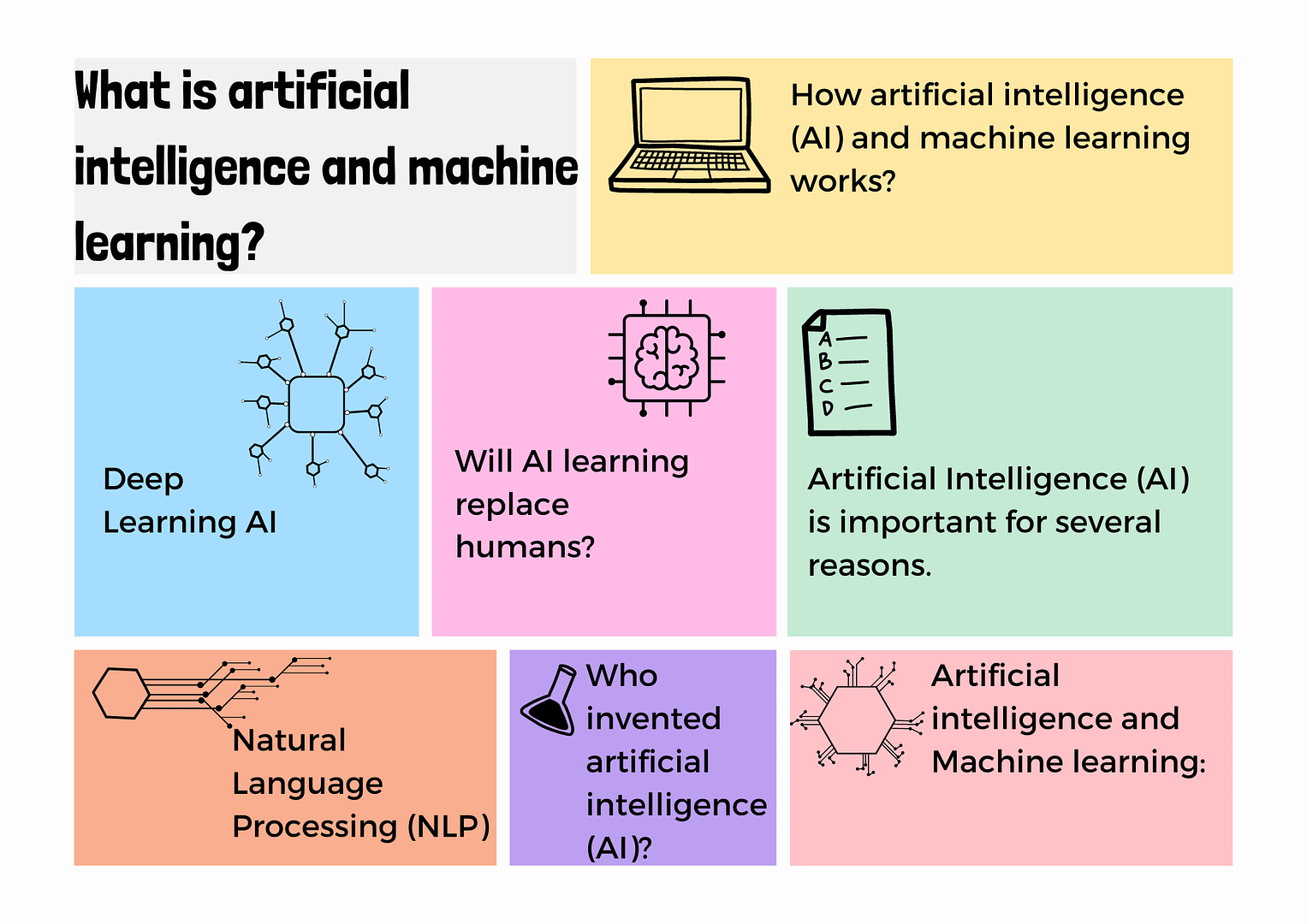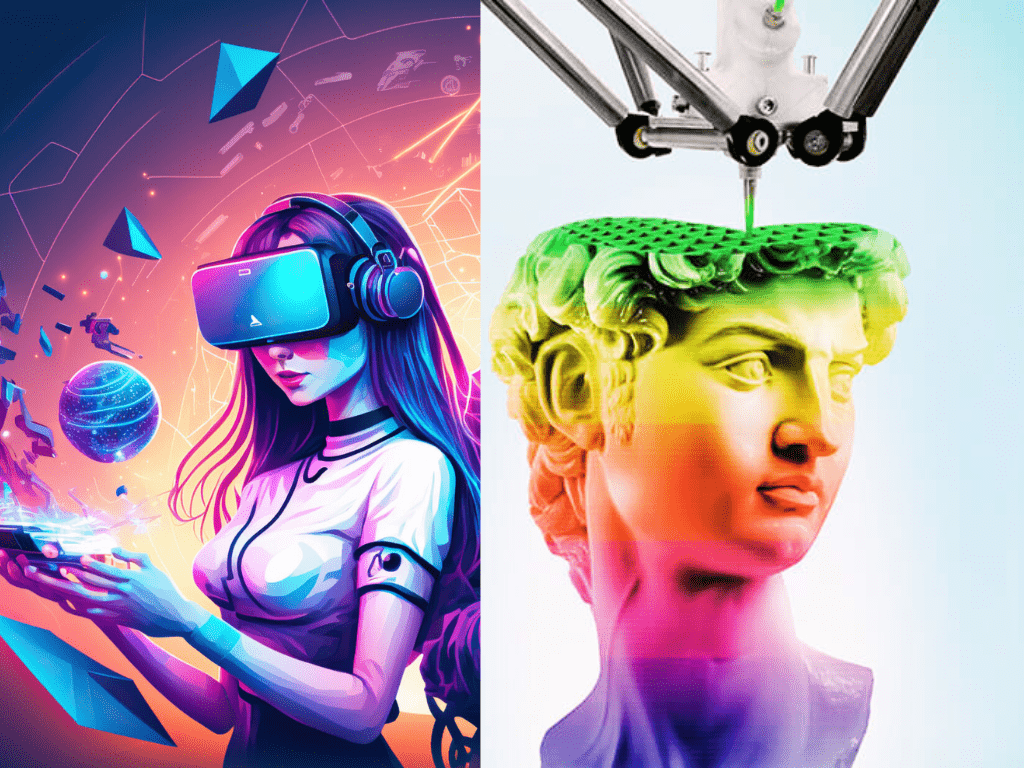AI: What does it mean?
Artificial Intelligence (AI) and machine learning refers to the simulation of human intelligence in machines that are designed to think and act like humans. These machines use algorithms and statistical models to perform tasks that typically require human intelligence such as visual perception, speech recognition, decision-making, and language translation.
What is the meaning of Machine learning?
Machine learning refers to the field of study and practice that enables computers to learn and improve from experience without being explicitly programmed. It involves developing algorithms and models that allow machines to analyze vast amounts of data, detect patterns, and make predictions or decisions with minimal human intervention.
Who invented artificial intelligence (AI)?
The concept of artificial intelligence machine learning has been around since the mid-20th century, and its development is credited to a number of computer scientists, mathematicians, and cognitive psychologists.
The term “artificial intelligence” was first coined in 1956 by John McCarthy. The field of AI has since grown into an interdisciplinary effort involving computer science, engineering, mathematics, and psychology, with contributions from many individuals and organizations.
Today, deep learning AI technology continues to evolve, and AI is being used in a variety of industries, including healthcare, finance, and transportation. The future of AI is expected to bring even greater advancements, but also raises ethical and societal questions.

How artificial intelligence (AI) and machine learning works?
Artificial Intelligence (AI) works by using algorithms and statistical models to perform tasks that would typically require human intelligence. These algorithms and models are trained on large amounts of data, allowing them to identify patterns and make predictions.
There are several different approaches to AI, including:
Machine Learning:
This involves training algorithms on data to enable them to learn and make predictions. There are several types of machine learning, including supervised, unsupervised, and reinforcement learning.
Deep Learning AI:
This is a subfield of machine learning that involves training artificial neural networks on large amounts of data. These networks can be used for tasks such as image and speech recognition.
Natural Language Processing (NLP):
This is the application of AI to process and understand human language. NLP systems can be used for tasks such as language translation, sentiment analysis, and question-answering.
Robotics:
This involves the application of AI to physical robots, enabling them to sense their environment, make decisions, and carry out actions.
Artificial intelligence and Machine learning:
Artificial intelligence works by utilizing AI technology, such as artificial intelligence and machine learning algorithms, to create intelligent virtual entities and environments. These entities can include avatars, digital beings, and AI-powered objects that can interact with users in real-time.
For example, in a virtual games, AI technology can be used to create non-player characters (NPCs) that can respond to player actions and decisions in a more dynamic and lifelike manner.
In this context, AI algorithms can be used to analyze patient data and provide real-time insights and recommendations to healthcare professionals.
Elon Musk, the CEO of Tesla and SpaceX, has been vocal about his concerns regarding the potential risks of AI and the importance of developing AI in a responsible manner. He has also invested in companies developing AI technologies.
Artificial Intelligence (AI) is important for several reasons:
- Deep Learning AI technology can automate tasks that are repetitive, dangerous, or too complex for humans to perform. This can increase efficiency, accuracy, and safety in industries ranging from manufacturing to healthcare.
- AI can analyze vast amounts of data and provide insights that would be difficult or impossible for humans to find. This can lead to new breakthroughs in fields such as medicine, finance, and marketing.
- AI can help to improve decision-making by providing real-time data and predictions. This can lead to better outcomes in fields such as investment, risk management, and public policy.
- Deep Learning AI has the potential to solve some of the world’s biggest challenges, such as climate change, poverty, and disease. AI projects in fields such as renewable energy, crop optimization, and personalized medicine have the potential to make a significant impact.
- AI machine learning has the potential to enhance human creativity and cognitive abilities. AI tools can assist with tasks such as language translation, writing, and artistic expression.
AI is a rapidly evolving field, and its importance will only continue to grow in the future. As AI machine learning technology advances and becomes more integrated into our lives, it will be important to consider its ethical and societal implications, as well as its potential risks and challenges.

Will AI learning replace humans?
The impact of artificial intelligence (AI) machine learning technology on the job market is a widely debated topic.
- While some experts predict that AI will lead to significant job losses in certain industries, others believe that it will create new job opportunities.
- It is widely believed that AI and automation will replace certain jobs that are repetitive or require lower-level skills.
- On the other hand, the development and deployment of AI is also likely to generate new job opportunities in fields such as AI development, data analysis, and cybersecurity.
- In addition, AI can also enhance and augment human work, rather than replace it, leading to improved productivity and job satisfaction.
- The future of work will likely involve a combination of humans and AI working together to achieve common goals.
Overall, the impact of AI on the job market will depend on various factors, including the speed of AI development, the rate of technological change, and the ability of workers to adapt to these changes. It is important for both individuals and organizations to continuously develop their skills and adapt to the changing job market.
Conclusion:
FutureTechVerse shares unique and authentic information of technology, so stay tuned.
Artificial intelligence (AI) is a rapidly evolving field that encompasses a wide range of technologies and techniques, including machine learning, natural language processing, and computer vision. AI machine learning has the potential to bring about significant advancements and benefits in various industries, including healthcare, finance, and transportation.
Frequently Asked Questions
What does artificial intelligence and machine learning do?
A subset of artificial intelligence called machine learning makes it possible for machines and systems to learn on their own from their experiences and advance. Machine learning employs algorithms rather than explicit programming to analyse massive volumes of data, gain knowledge from the findings, and then make judgements.
What is an example of machine learning?
Here are some real-world instances of machine learning at work, adding value in both significant and minute ways.
- Face-to-face identification.
- Recommendations for products.
- Spam filtering and email automation.
- Financial precision.
- Optimisation for social media.
- Healthcare improvement.
- Predictive text and speech to text on mobile.
Why should I learn AI and machine learning?
AI and machine learning are extremely popular in many industries, including technology, finance, and healthcare. Developing these talents could improve your professional prospects and make you more marketable.
How is AI used today?
Technologies that are AI- and machine learning-enabled are already in use in a variety of industries, including healthcare, robotics, science, education, the military, surveillance, finance and its regulation, retail, customer service, and manufacturing.

